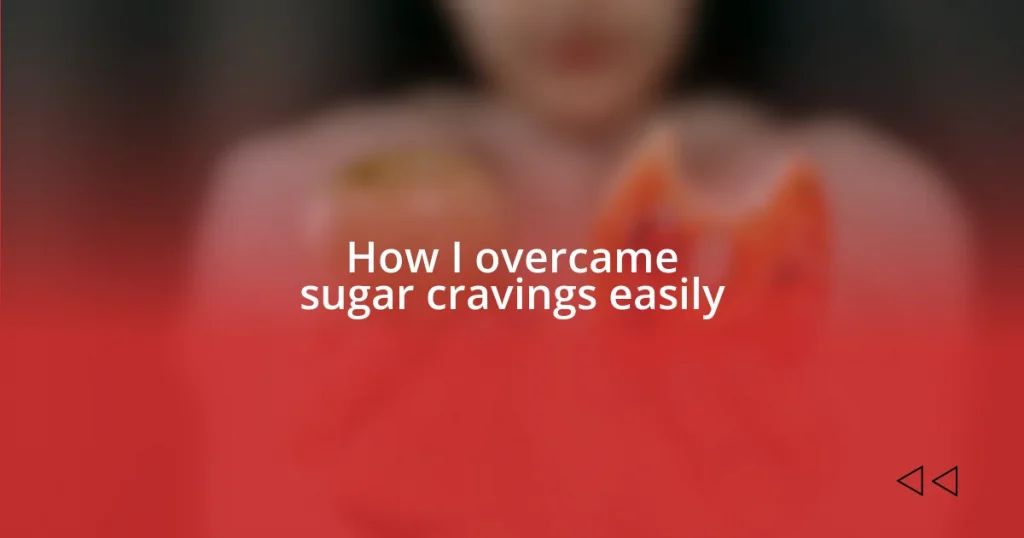Key takeaways:
- Understanding sugar cravings often involves recognizing emotional triggers, fatigue, and habitual responses rather than true hunger.
- Incorporating healthy alternatives like fruits, honey, and spices can satisfy cravings without the drawbacks of refined sugar.
- Creating a supportive environment and tracking progress are essential for successfully managing and reducing sugar cravings over time.
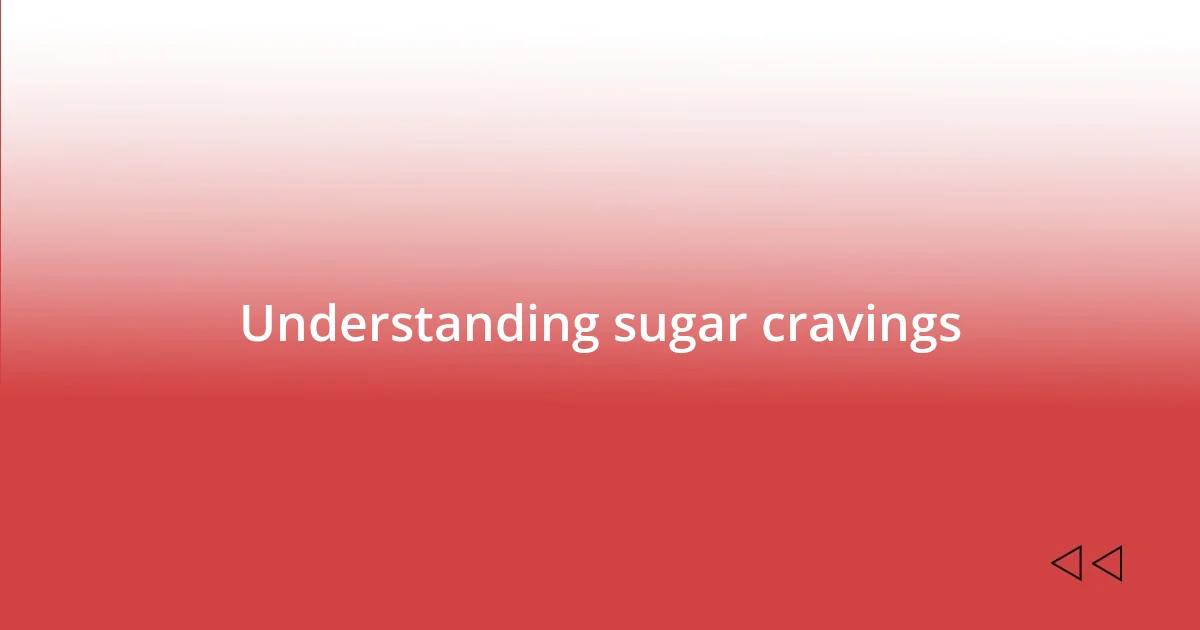
Understanding sugar cravings
Sugar cravings can often feel overpowering, leaving many of us reflecting on why we reach for that sweet treat during stressful moments. I remember late nights working on a project, when a sudden urge for chocolate would hit me—didn’t I just finish dinner? Those cravings seem to spring from somewhere deep, often tied to our emotional states or even habits we’ve formed over the years.
It’s fascinating to consider how our brains respond to sugar. When I indulged in a sugary snack, it wasn’t just about the taste; I felt an instant mood lift. This happens because sugar triggers the release of dopamine, the feel-good hormone. But then, the sugar high fades, often leaving me feeling worse than before—did I really need that boost, or was it all in my head?
Understanding that my cravings came from emotional triggers rather than true hunger was a game changer for me. Have you ever wondered if those late-night candy runs are about comfort rather than desire? By examining my feelings during those moments, I began to realize that a walk outside or a few deep breaths could often be much more fulfilling than any sugary snack.
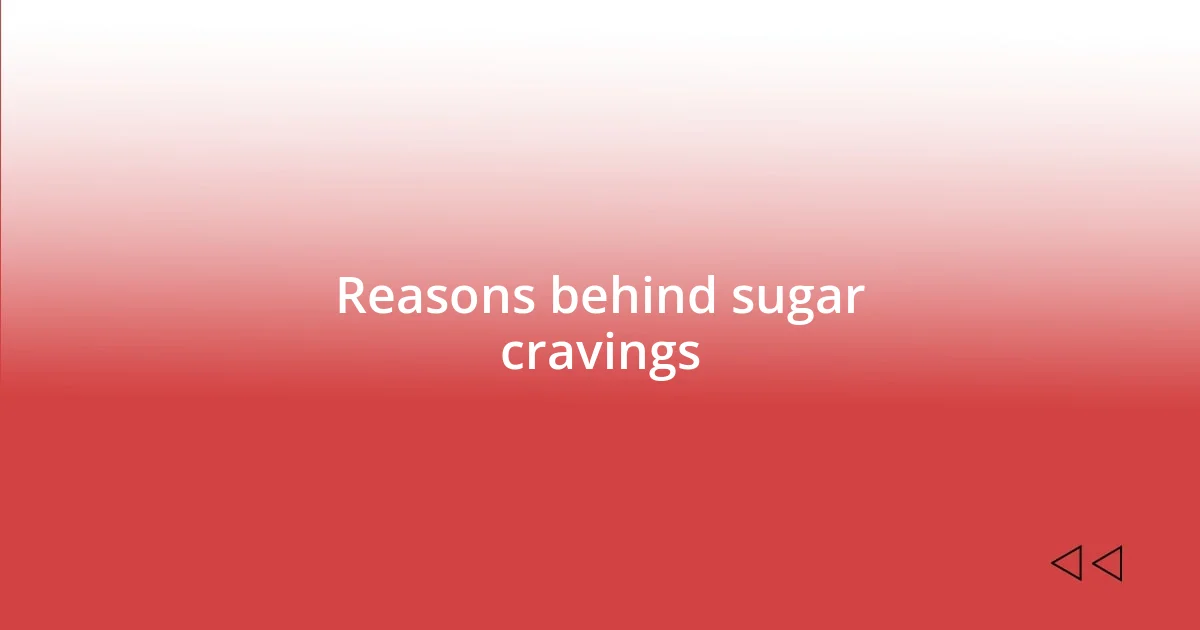
Reasons behind sugar cravings
Sugar cravings often stem from a mix of biological and emotional factors. For me, there were times when stress and fatigue amplified my desire for sweet treats. When I’d had a long day, the thought of reaching for some cookies felt like a comforting escape. That’s when I learned that our brains often mistake fatigue for hunger, leading us straight toward that candy jar.
Here are some common reasons why we crave sugar:
- Emotional Triggers: Stress, sadness, or even boredom can push us toward sugary foods as a source of comfort.
- Fatigue: Lack of sleep can make us seek quick energy boosts, and sugary snacks seem like an easy solution.
- Habitual Responses: I found that certain activities, like watching a movie, became associated with snacking, reinforcing my cravings.
- Nutritional Deficiencies: Sometimes, our bodies crave sugar because they’re lacking vital nutrients, like magnesium, which can actually lead to a yearning for sweets.
- Blood Sugar Levels: I realized that prolonged gaps between meals can lead my blood sugar to dip, triggering an urge for something sweet for a quick energy fix.

Healthy alternatives to sugar
When I started looking for healthy alternatives to sugar, I discovered that nature has provided us with some amazing choices. Fruits, for instance, can satisfy that sweet tooth while delivering essential vitamins and fiber. I remember switching from candy bars to dates—it amazed me how their natural sweetness could provide the same satisfaction without the sugar crash that typically follows processed sweets.
Another alternative that really caught my attention was honey. Not only does it add sweetness, but its antibacterial properties give it an edge over regular sugar. I’ve enjoyed adding a drizzle of honey to my tea or yogurt, turning a simple snack into a delicious treat. It’s like I found a way to still indulge without guilt!
Lastly, I found that using spices can greatly enhance the flavor of my meals and desserts without any added sugar. For instance, cinnamon has become one of my kitchen staples, and I often sprinkle it on oatmeal or baked goods. These alternatives provided me with a healthy craving satisfaction, making me realize that there’s an exciting world beyond refined sugar.
| Alternative | Benefits |
|---|---|
| Fruits (e.g., dates, bananas) | High in nutrients and fiber, natural sweetness |
| Honey | Contains antioxidants; boosts metabolism |
| Cinnamon | Enhances flavor; may help regulate blood sugar |
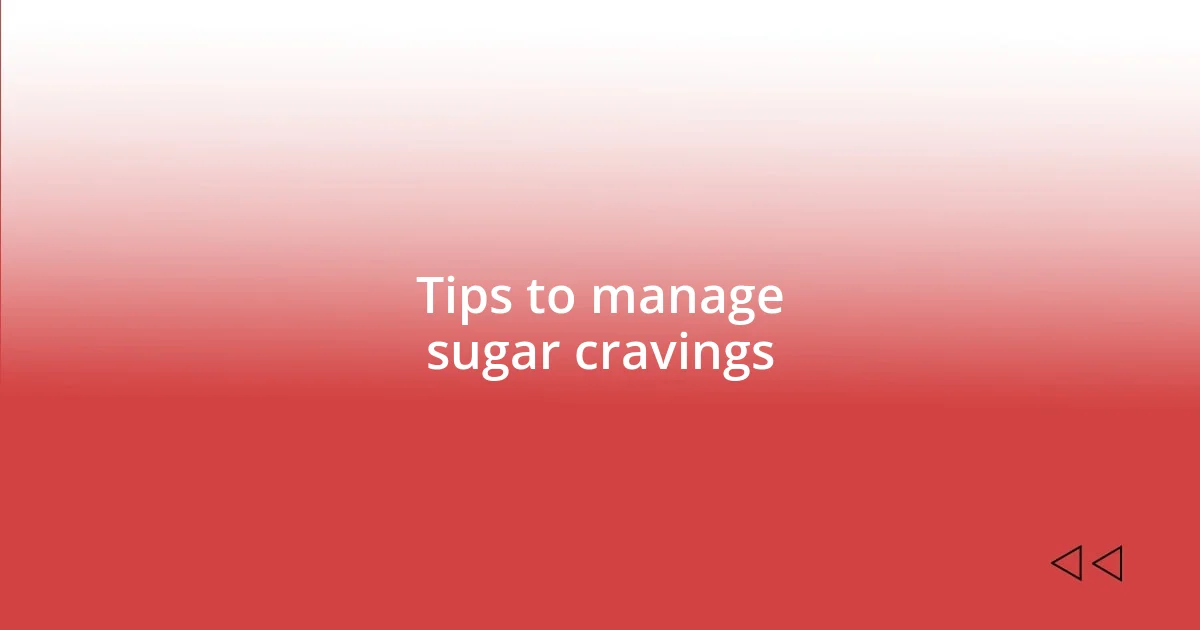
Tips to manage sugar cravings
Managing sugar cravings can be a challenging journey, but I’ve found several practical tips that have helped me tremendously. One key approach is staying hydrated. It’s surprising how often we confuse thirst with hunger. I’ve caught myself reaching for sweets when all I really needed was a glass of water. Keeping a water bottle nearby serves as a constant reminder to hydrate, and it often curbs those pesky cravings before they escalate.
Another effective strategy involves incorporating more balanced meals into my day. I began focusing on including fiber and protein in each meal, which helped me feel fuller longer. I remember the first time I included black beans in my salad; the combination of nutrients kept me satisfied, drastically reducing my urge to reach for sugary snacks later on. It’s fascinating how adjusting what’s on your plate can directly impact your cravings.
Finally, I discovered the power of mindfulness and distraction. When I felt a craving creeping in, I would take a moment to pause and breathe. Often, asking myself, “Am I truly hungry or just bored?” helped me assess what I was feeling. Engaging in a quick walk or diving into a new hobby shifted my focus and allowed the craving to fade away naturally. It’s empowering to realize that cravings can often be managed with a little awareness and a few adjustments to our daily habits.
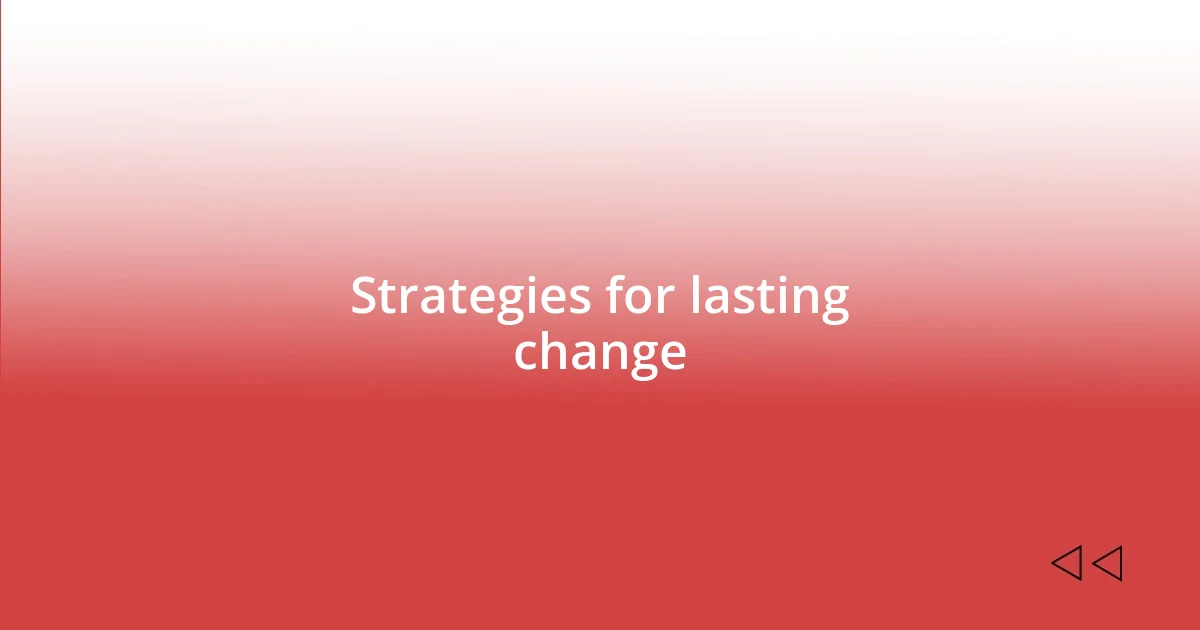
Strategies for lasting change
When I committed to changing my relationship with sugar, one strategy that truly transformed my journey was meal prep. I started dedicating Sundays to preparing healthy snacks and meals for the week. Honestly, it felt like a game-changer! Having pre-portioned, nutritious options readily available meant I could easily resist reaching for sugary temptations during those busy weeknights. It’s incredible how planning ahead can create a buffer against impulse decisions.
Another strategy I found effective was embracing the notion of gradual change. But here’s the thing—going cold turkey on sugar never worked for me. Instead, I focused on reducing the sugar content in my favorite recipes slowly. For example, when baking, I’d cut down the sugar quantity by half and tried substituting with mashed bananas or applesauce. I remember the first time I did this; I was amazed at how delicious the treat still turned out! This gradual approach not only helped curb my cravings but also made my palate more attuned to natural sweetness over time.
Lastly, I discovered the importance of social support in managing cravings. Surrounding myself with friends and family who encouraged my healthier choices made a big difference. I’ll never forget that one evening when we all got together for a “sugar-free dessert” night. Sharing recipes and tasting each other’s creations made me feel like I wasn’t alone in my quest. It made me think—how much more motivated can we be when we have a community pushing us forward? It’s a powerful reminder that making changes can be a collaborative journey rather than a solitary struggle.

Creating a supportive environment
Creating a supportive environment is essential in overcoming sugar cravings. I noticed that simply clearing out my pantry of sugary snacks made a huge difference. It was one weekend when I decided to part with those tempting treats; the moment I did, I felt a weight lift off my shoulders. I realized that reducing temptation from my immediate surroundings created a space where my resolve could flourish instead of falter.
Having a network of like-minded individuals has also been incredibly beneficial. I remember joining a local health group where we shared not just recipes but also strategies to overcome cravings together. One evening, we discussed our triggers, and I found that hearing others’ experiences made me feel less isolated in my struggles. I started wondering—how often do we underestimate the power of community in our personal journeys? Relying on others for support helped foster accountability, keeping me motivated to stay on track.
Finally, I recommend creating a home atmosphere that promotes healthy choices. For example, I made a small but impactful change by placing fruits in a bowl on the kitchen counter. It felt inviting and colorful, almost like a piece of art! When I noticed it every day, I started gravitating towards those natural snacks instead of searching for sugar-laden options. Isn’t it fascinating how small changes in our environment can lead to big shifts in our behaviors? An environment that aligns with our goals can make all the difference in staying committed to healthier choices.
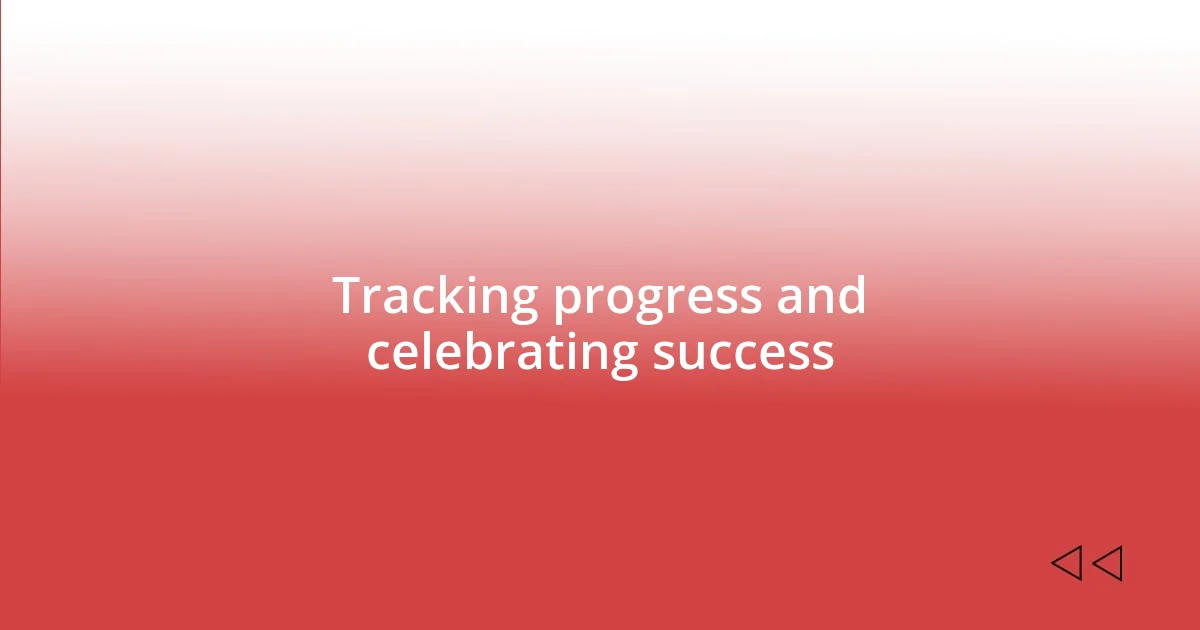
Tracking progress and celebrating success
Tracking my progress was an eye-opening experience. I began by keeping a journal, noting not just the number of sugar-free days, but also how I felt physically and emotionally. There were moments when I genuinely celebrated small victories—like that time I resisted a sugary dessert at a friend’s birthday party. Looking back and seeing those entries, I recalled the rush of pride that washed over me. It made me appreciate how far I’d come, and honestly, it gave me the motivation to keep pushing forward.
I also embraced the notion of rewarding myself for reaching certain milestones. I vividly remember the day I hit my one-month mark without refined sugar; I treated myself to a lovely day out. Instead of indulging in sugary sweets, I chose a fancy latte with almond milk and a delicious fruit platter. It was a simple celebration, but it filled me with joy! Reflecting on those moments, I realize how important it is to recognize achievements—big or small—because it strengthens my commitment and reinforces that positive behavior.
As I ventured further along my journey, I started sharing my progress with friends and family. It was empowering to receive encouragement and support during every little achievement. One day, I received a message from a friend who had noticed my healthier choices and decided to join me in cutting back on sugar. It struck me; how rewarding is it to inspire others while also tracking personal progress? This sense of community not only celebrated individual successes but also fostered camaraderie in our shared goals.










